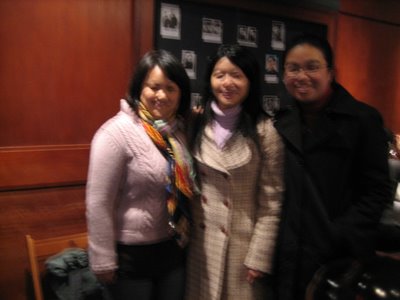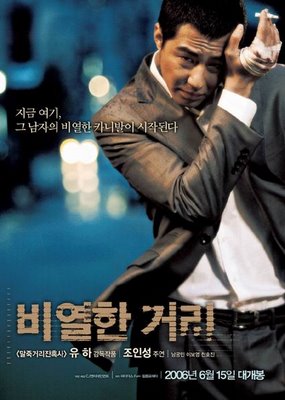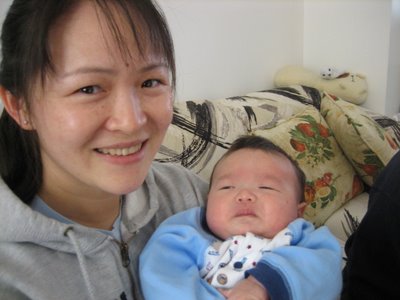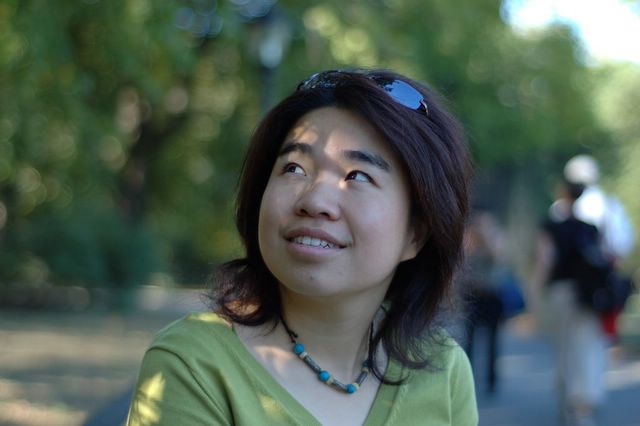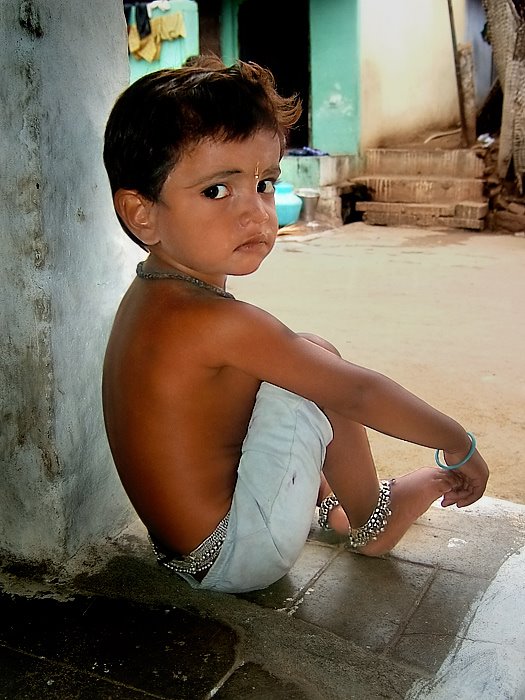
2006年12月30日星期六
2006年12月29日星期五
The first-class failure

“And yet it all seems limitless”

In the beginning of The Painted Veil, there is a sentence “the longest journey in the world is the distance between two people”. The Painted Veil is a 1925 novel by W. Somerset Maugham . It is also a beloved screenplay, which has been adapted into film in 1934, 1957 and 2006. According to wikipedia, “The Painted Veil is a 1934 drama film made by MGM. It was directed by Ryszard Bolesławski and produced by Hunt Stromberg from a screenplay by John Meehan, Salka Viertel, and Edith Fitzgerald, adapted from the 1925 W. Somerset Maugham novel The Painted Veil. The film stars Greta Garbo as Katrin Koerber Fane, Herbert Marshall as Dr. Walter Fane and George Brent as Jack Townsend, with Warner Oland and Jean Hersholt.” “The Seventh Sin is a 1957 film based on the 1925 novel The Painted Veil by W. Somerset Maugham. It was adapted for the screen by Karl Tunberg and drected by Ronald Neame. Vincente Minnelli was uncredited but involved in directing prior to leaving the project. Bill Travers stars as Doctor Walter Carwin and Eleanor Parker plays his wife Carol.”
The most recent adaptation is directed by John Curran and stars Naomi Watts, Edward Norton, and Liev Schreiber. “Kitty Fane (Watts) marries Dr. Walter Fane (Norton) even though she does not really love him. The Fanes move from England to China, where Dr. Fane is stationed in a government lab studying infectious disease. Kitty has an an affair with diplomat Charlie Townsend (Schreiber), and when Walter finds out, he gives her an ultimatum: come with me to the Chinese interior to assist with a cholera epidemic, or be served with divorce papers. When Charlie refuses to leave his wife for Kitty, she chooses to travel with her husband. The Fanes' marriage slowly blossoms into love as Kitty sees what a good man her husband is. She begins to assist at the local orphanage, while Walter tends to the sick and looks for a way to stop the spread of the epidemic despite resistance from the local populace. Kitty learns she is pregnant but is unsure who is the father, yet Walter remains with her. Just as the local cholera problem is resolved, diseased refugees from downriver pour into the area, forcing them to set up a refugee camp outside town. Walter contracts cholera and dies after several days. Kitty returns to London, and five years later runs into Charlie Townsend on the street as she walk with her young son. Kitty rejects his overtures and walks away.”
The story line is quite simple, comparing to the more appealing story such as The Sheltering Sky by Paul Bowles. In many ways, these two films resemble each other: exotic setting, marriage without loves, overwhelmingly and deadly disease. However, they are foundamentally different. The Painted Veil has faith in love and in good human nature. Walter and Kitty were trapped in their marriage, but they were young and energtic and had ability to speak out their love. The cholera epidemic only made them to feel the presence of each other and the strength of each other. W. Somerset Maugham was a romantic writer in essence and he aovided the underlying conflict between the east and west, male and female, the cosmopolitian and rural life. In his world, love was human’s nature and would grow up even in the most harsh environment.

But 24 years later, Paul Bowles broke this kind of romantic fairtale by his painstakingly written work, The Sheltering Sky. The story centers on Port and Kit Moresby, a married couple originally from New York who travel to the North African desert accompanied by their friend Tunner. The journey, initially an attempt by Port and Kit to resolve their marital difficulties, is quickly made fraught by the travelers' ignorance of the dangers that surround them. During their journey, Port and Kit became intimate again but they realized the love between them was impossible. They were doomed to be alone and lonely. After they passionately made love under the bare sky, Port signed that the sky was so heavy. Port died in the journey and Kit wondered in the dessert and became slave of a young man from the dissert. They did not know each other’s language, or culture or even way of making love. They stayed together and did nothing except making love. I try very hard to understand what this means for Kit. Eventually, I come to the conclusion that the story had no faith in love, or put it differently, the author feared human being were too weak to carry on any type of love, physically or emotionally. In name of love, people become intimate and then turn into stranger. The foundamental tragedy of life was a lake of the feeling of grativity, an emotional latitude which was impossible to reach or sustain. Who can boldly claim he or she can love in the same intensity always, against our aging process and the endless suffering of life?
In the book, Bowles wrote: “Because we don't know when we will die, we get to think of life as an inexhaustable well. Yet everything happens only a certain number of times, and a very small number really. How many more times will you remember a certain afternoon of your childhood, some afternoon that is so deeply part of your being that you, that you can't even conceive of your life without it? Perhaps four or five times more, perhaps not even that. How many more times will you watch the full moon rise? Perhaps 20. And yet it all seems limitless.”
Yet another 36 years later, Patrick Süskind wrote his elergy of love under the name Perfume: The Story of a Murderer. He created a unknown legend of 18 century France, a great perfumer of all time, Jean-Baptiste Grenouille, “whose prodigious gift of an incomparable sense of smell and inexplicable lack of personal scent isolates him from society. Obsessed with the rich sensory world he alone inhabits, his single objective in life becomes the preservation of the perfect scent: the skin of young, beautiful virgins”.
In this story, the author did not even bother to create a love story. All the girls in the story were only instruments for Grenouille and their lives were meaningful only for their particularity in odor. In the end of the novel, Grenouille’s lack of smell was depicted as his incapable to love and to be loved. He never got an education for love and in the story, love was not a nature either. He did not have it and he did not know that he did not have it. In Grenouille’s eyes, there was no body, no beauty, and no physical attraction. The girls were purely objectives, not subjectives. In his eyes, each individual degenerated into an odor, a symbol, an element. Love and passion are simple not possible to arise by nature, but have to be induced by external force (perfume in this case). In the last scene of the film, Grenouille used the power of the perfume to control the people, who started to make love openly in the square. The intoxicate smell of the perform transformed into the most exotic sensation, which Grenouille himself was incapable of particiating. His fate is the fate of modern men, the generation who believe in science, in experiment, and belive in their unique right to the world. However, love is already out of their equation, even though people believe otherwsie.
In the Magic Flute, Tamio searches for spiritual love and Papageno tries to find his mate. Deep down in Mozart’s mind, there is the believe in the existence of love and people’s ability to capture their love through their effort and sacrifice. Two hundred years later, we stand in the waste land of emotion and cry for our lack of willingness to love. “And yet it all seems limitless”.
Letter to a Friend
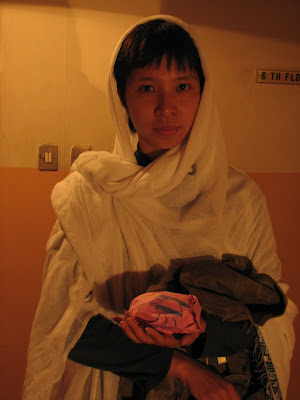
Christmas Week
 Dec 21st: Picked up Chen at Penn Station; had dinner at Korean town; went to see The Painted Veil at Lincoln Center Plaza Cinema; chated till 3:00am in the morning; saw her off to London;
Dec 23rd: helped Yan to move out and had breakfast together; went to Fang’s home for lunch and met with Li Xia and Wang Yijia (brought two shoes from Aerosoles); went to Penn Station to pick up Mingwei; Met Xu at home; Went out with Mingwei and Xu to see the Christmas tree at Rockefeller Center; chat till morning;
Dec 24th: had late brunch; went to central park and met beautiful weather in the Park; spent couple of hours at Met Museum and enjoyed the café; walked down Madison Ave and picked up Jifeng at 68 street; went to Yijia’s hotpot party and sung Karaoke all night long; came back and had tea till late night;
Dec 25th: got up late; went to 68 street to see Happy Feet with IMAX; had bad stomach; went a long way to Flushing with Xu and Jifeng to meet Jin and Ma Yue for dinner; had bubble tea together and chatted all night;
Dec 26th: Jifeng and Xu failed to get any sleep; Went to Met Opera and got tickets for The First Emperor; met Mingwei at MoMa and spent hours there; got dressed for the opera and spent the night there; chatted till the morning;
Dec 27th: Got up late and sent Mingwei to Penn Station (I have a weird feeling about that station); came back and sent Xu to bus station; went to Met Opera with Zhan and Xiaohong for the rush tickets for I Puritani and failed to get the tickets; instead went to Korean town for a great dinner;
Dec 28th: Slept for 12 hours; went to Doctor and finished visa forms; found out a job offer; decided to treat myself well and went to see The Perfume and The Queen at Lincoln Plaza Cinema.
Dec 21st: Picked up Chen at Penn Station; had dinner at Korean town; went to see The Painted Veil at Lincoln Center Plaza Cinema; chated till 3:00am in the morning; saw her off to London;
Dec 23rd: helped Yan to move out and had breakfast together; went to Fang’s home for lunch and met with Li Xia and Wang Yijia (brought two shoes from Aerosoles); went to Penn Station to pick up Mingwei; Met Xu at home; Went out with Mingwei and Xu to see the Christmas tree at Rockefeller Center; chat till morning;
Dec 24th: had late brunch; went to central park and met beautiful weather in the Park; spent couple of hours at Met Museum and enjoyed the café; walked down Madison Ave and picked up Jifeng at 68 street; went to Yijia’s hotpot party and sung Karaoke all night long; came back and had tea till late night;
Dec 25th: got up late; went to 68 street to see Happy Feet with IMAX; had bad stomach; went a long way to Flushing with Xu and Jifeng to meet Jin and Ma Yue for dinner; had bubble tea together and chatted all night;
Dec 26th: Jifeng and Xu failed to get any sleep; Went to Met Opera and got tickets for The First Emperor; met Mingwei at MoMa and spent hours there; got dressed for the opera and spent the night there; chatted till the morning;
Dec 27th: Got up late and sent Mingwei to Penn Station (I have a weird feeling about that station); came back and sent Xu to bus station; went to Met Opera with Zhan and Xiaohong for the rush tickets for I Puritani and failed to get the tickets; instead went to Korean town for a great dinner;
Dec 28th: Slept for 12 hours; went to Doctor and finished visa forms; found out a job offer; decided to treat myself well and went to see The Perfume and The Queen at Lincoln Plaza Cinema.
2006年12月27日星期三
2006年12月21日星期四
Prince in the slippers

Won’t you fall in love with a prince with slippers? Tamio in the Die Zauberflöte yesterday night actually had a pair of purple slippers. I guess it might be the fashion in ancient Egypt. As the most welcomed performance for kids, Met Opera in fact prepares two version of the show: one full-length version of Die Zauberflöte and one 90 minutes version of Magic Flute for family. In order to have a better view from my H110 at family circle, I finally got myself a binocular and it worked perfectly.
Die Zauberflöte is a story of “love can conquer all”. From Wikipedia:
“Die Zauberflöte, K. 620, (en: The Magic Flute) is an opera in two acts composed by Wolfgang Amadeus Mozart to a German libretto by Emanuel Schikaneder. The work is in the form of a Singspiel, a popular form which included both singing and spoken dialogue. The opera is often noted for its prominent Masonic elements. Both Schikaneder and Mozart were Masons and lodge brothers, though the Freemasons were at the time regarded by the public at large as a dangerous and subversive organization. The opera is also heavily influenced by Enlightenment philosophy, and can be regarded as an analogy for enlightened absolutism. The Queen of the Night represents irrational-diabolic obscurantism, whereas her antagonist Sarastro symbolises the reasonable sovereign who rules with paternalistic wisdom and enlightened insight. In the end he prevails over the darkness ("The sun's rays drive away the night, destroy the evil power of the dissembler"). But the darkness is by no means frightening and abhorrent, but beautiful, mysterious and fascinating. As an awesome seductress the Queen of the Night is a dangerous power who can only be overcome by knowledge.
A notable feature of the music is the way in which Mozart was able to write for a range of skill-sets in the singers. Compare, for example, the vocal lines for Monostatos (which are easy, "obvious" lines to sing for a modest voice; are also often stated first in strings so the singer can find his pitch; and which are doubled as he sings, to give him the tune – anyone who has sung a karaoke arrangement of a well-known song will know the kind of process) with those of Pamina or the Queen of the Night (which give few such clues for the singer and demand decent operatic ability). Yet, in ensembles, Mozart manages to combine voices of virtuosos with those of what are essentially comic actors, and create a satisfying result. The F6 which the Queen of the Night must reach in both her arias is beyond the range of many first-rate sopranos. At the low end, Sarastro must sing an F at several points; it requires a good bass to hit the note impressively, but the note does not go below the range of the choral basses.” 
Julie Taymor's magical production of Mozart's sublime and mystical opera features bears and serpents, and, of course, a rotating cast of internationally acclaimed young singers, including soprano Isabel Bayradkarian and baritone Nathan Gunn. James Levine conducts the performance the past night. The stage design was really splendid and the installations were made of glass. So you feel like going to a crystal world where fairy tale does happen. Basically, there were four sets of class stages and they can be separated as independent stage or combined together as a palace or temple. The light designer fully used the reflection of the class walls to create a fantastic dream world of all generations. The performance was so much like the hallowing parade, where performers in black customs manipulated flying sneaks, bears and birds on the stage. The bears were so cute and they were not terrifying at all. Among the singers, I like the Queen of the Night by Cornelia Götz. She really got the emotional intensity of the mad queen and her aria in Act II (Der Hölle Rache kocht in meinem Herzen) was very beautifully done. In terms of theatrical performance, Rodion Pogossov gave a wonderful interpretation of the carefree Papageno, who was longing for a Papagena but not the exhalted brotherhood. The bass, Sarastro by Stephen Milling, had several wonderful arias, including the everlasting masterpiece “O Isis und Osiris”. Tamino was played by Christoph Strehl, he is quite handsome but not sing as well.
The story itself is interesting. The notes on the making of the opera said the story was built upon fairy tale and the play was a combination of pop “magic story” of 18 century and elegant operatic form. The liberetto and stage designer was friend of Mozart and he wanted something for all kinds of audience for his popular theater. Mozart created this wonderful piece which masterfully combined different opera genres without compromised its playfulness and humor. In fact, the play is nothing but a great challenge for stage design, because the scene changes so often and it demands changes in short period of time. I can hardly imagine how the dying Mozart created this work of art dedicated to love and life. In the play, he praised the merit of love, friendship and brotherhood which he would soon lose forever. It is such a great irony that he composed and conducted the opera and died three months later. The opera was like his last call for life, crystallizing all his passion for being human and being in love. In contrast to Wagner’s overwhelming heroic and epically tales, Mozart’s play is much more delicious. It becomes every child’s dream. Even when we grow up, we still hold those dreams dear to our heart. We love our princes even they wear only slippers. Whereas there is love, there is hope!
2006年12月17日星期日
Friends will come for Xmas
韩剧编剧攻略不完全手册

最近无聊至极在看韩剧,内心对自己充满了鄙夷之情。鄙夷之余,发现韩剧的编剧真是简单的可以,但是不知道为什么人们还是乐此不疲。基本上来说,所有的故事都是以所谓的循环逻辑和不对称为主题的。在叙事的情节上,一般采用顺时的叙事结构,也有少数喜欢玩闪回和快进。多数故事采用cross-sectional data,但是少数故事喜欢套用Panel data来增加刺激性。故事的关键在于再不可能的条件下开展不可能成功的爱情,然后在最不符合情理的条件使不可能成功的爱情成功。以下分文别类的加以论述并讨论具体的案例。
一、所谓的循环逻辑就是指在故事的陈述和人物关系上安排大大小小的loop,使得每个人都在追求那个追求不到的人,而且这些人之间都有“剪不断,理还乱”的关系。因此故事的主人公们往往会在爱情、友情和亲情这三个层次上发生各种合法或者不合法、符合伦理或者不符合伦理的关系。往往是由于个人在友情和亲情上的关系,使得他们的爱情具有不合法性。而这种不合法性使得这些爱情具有暧昧的魅力。
a. 爱情和亲情的矛盾。例如兄弟二人先后爱上一个女人,《春日》里面在哥哥变傻之后,弟弟爱上了哥哥的女朋友。有时兄弟二人同时爱上一个女人,比如《对不起我爱你》中间的同父异母兄弟。
b. 爱情和友情的矛盾。著名的《冬季恋歌》,三个好朋友先后爱到一起,随后一方为了另一方牺牲了自己的爱情。《雪之女王》里面男生发现女友是自己已经死去的少年时最好男友的妹妹,其实根据剧情的描写,那两个男生颇有断背之情的嫌疑。
c. 爱情和爱情的矛盾。《恋人》里面,一个和女友同居的男人发现了自己爱上了女友的邻居。在《冬季恋歌》里面,男人发现自己的未婚妻重新投入前男友的怀抱。
二、不对称性是指人物在社会地位、身体条件或者其他方面具有很大的差异,因此导致他们的爱情不可能成功。而这些外界因素的限制,才使得剧情跌宕起伏、引人入胜。
a. 社会地位的限制:比如财富或者身份的差异,《爱在哈佛》或者《黄手帕》里面王子爱上灰姑娘。在《大长今》里面,不该谈恋爱的宫女喜欢宫廷命官,也够要命的。
b. 身体条件的限制:例如年龄,在《我是金三顺》和《狐狸,你在干吗呢?》里面大玩姐弟恋的故事就是典型。例如健康,《对不起我爱你》、《雪之女王》、《冬季恋歌》或者《秋天的童话》里面,男女主人公总有一个得了要死的病,所以他们的爱情故事才缠绵悱恻、令人为之气结。
c. 其他的限制:学历和社会地位的差别,比如在《恋人》里面女医生爱上黑社会混混。
三、在叙事情节上,多数按照时间的发展而推进。也有少数喜欢插入几代人的爱恨情结,在时间上来来回回,没完没了。
a. Panel data: 最典型的莫过于《宫》,子女一代重演父母一代人的故事,兄弟二人同时爱上一个女人。新仇旧恨一时涌上心头,难怪有的时候要动拳头。《夏娃的诱惑》先写在国外的前传,在续在国内的恩怨情仇。同样的《我是金三顺》里面,本来就不平静的姐弟恋到了中间,好要插入男生和前女友的复合来增加刺激。《火鸟》里面两个离婚的男女要再一次陷入爱情。
总的来说,韩剧可以用黄舒俊的《恋爱症候群》来概括:“恋爱不但是一种病态,它还可能是一种变态”。
2006年12月16日星期六
实话别跟我说
2006年12月12日星期二
Russianmania
 (Dmitri Hvorostovsky)
The shining Christmas Tree before the Met Opera always reminded me the old fashined comedy, The Moonstruck. In the end of the movie, Nicolas Cage waited there for Cher to come and join him for an opera night. Everything is incredibly romantic and real! I always get this kind of transformative feelings after a night at Met. I never figure out it is due to the music, the liboretto, the stage, or the audience, or the mixture of all. The opera brings the past to the present, bring the alien country before our very eyes, and most importantly allow us to explore the foreign feelings of love, loyalty, and pain in their full glory. Comparing to the climax of emotional turbulence on the stage, our daily life becomes trivial. You feel you live through the history and the moment of eternity at the ultimate end of the drama. That is I always feel this big vault in my mind after an opera night, in the meantime, I feel grateful because there is no other chance I could have been with Don Carlo at his fateful day, with Madam Butterfly at her exotic garden, or met Rigoletto at crossroad of his love and death.
Don Carlo at Met this season is a masterpiece. According to Wikipedia,
“Don Carlos is a five-act Grand Opera by the Italian composer Giuseppe Verdi with a libretto written in French by Camille du Locle and Joseph Méry, based on the dramatic play Don Carlos, Infant von Spanien ("Don Carlos, Infanta of Spain") by Friedrich Schiller. It received its first performance at the Paris Opéra on 11 March 1867.”
The musicality of the work is so carefully designed and the five major roles are played by top singers. I particularly like the two Russian musicians. Olga Borodina is a Russian diva and Mezzo-soprano, and she plays the tortured mind Eboli in Don Carlo. Three of her arias are so beautiful and in totally different mode. In Act I Scene I, Princess Eboli sings the Veil Song ('Nel giardin del bello') about a Moorish King and an alluring veiled beauty that turned out to be his neglected wife. Olga gives her figure the playfulness and flirtation character and her voice is full of temptation and desire. In Act II Scene I, Don Carlo rejected the love of Eboli, Eboli was so crazy and she committed to take revenge. Olga played the moment of madness so well that her regret in the end of Act III only becomes real because of this. After confessed her secrete passion for Don Carlo and involvement with the King, Eboli resolves to try to save Don Carlo ('O don fatale'). Olga’s voice changes its tune, plain and beautiful. Dmitri Hvorostovsky , as the fateful friend Rodrigo, give another wonderful performance. Also from Russia, Dmitri is a top baritone of our time. According to Wikipedia,
“ Hvorostovsky was born in Krasnoyarsk in Siberia. He studied at the Krasnoyarsk School of Arts under Jekatherina Yofel and made his debut at Krasnoyarsk Opera House, in the role of Monterone in Rigoletto. He went on to win First Prize at both the Russian Glinka Competition in 1987 and the Toulouse Singing Competition in 1988. Hvorostovsky came to international prominence in 1989 when he won the Cardiff BBC Singer of the World competition, beating local favorite Bryn Terfel. His concert recitals began immediately(London debut, 1989; New York 1990). His operatic debut in the West was at the Nice Opera in Queen of Spades (1989). In Italy he debuted at La Fenice as Eugene Onegin, a success that sealed his reputation, and made his American operatic debut with Chicago Lyric Opera (1993) in La Traviata. He has since sung at virtually every major opera house, including the Metropolitan Opera (debut 1995), the Royal Opera House at Covent Garden, the Berlin State Opera, La Scala and the Vienna State Opera.”
Hvorostovsky played Rodrigo, the Marquise de Posa, Don Carlo’s faithful friend and a symbol of liberation movement at the time. In the duet with the King Phillip II at the garden, he described the sufferings of Flanders people under the King’s cruel ruling. Refusing to listen to Rodrigo's pleas for Flanders, he nevertheless places his trust in him, while advising him to beware of the Grand Inquisitor. Here, Dmitri uses his voice to represent a brave soul for his own cause. In Act IV Scene I, Rodrigo decided to sacrifice himself to Grand Inquisitor to save Don Carlo. Dmitri expressed his complex feeling in such a delicate way that you almost feel the clash of his reluctance to die and his sense of duty to friend and his cause. Hvorostovsky will return to Met in Feb in my all-time favorite Eugene Onegin as the title role. My first time to listen to Onegin was back in college in an elective class. Pushkin’s sense of live and death, love and honor, immediately grasped my young soul. It is my first love of opera and the encounter is unforgettable.
I also enjoy the beginning of the Study scene in Act IV, where the aging king complains he never has the love of his queen and his life is close to its end. He demands the power of God to see human’s mind and feels the powerlessness of his current state in the struggle between church and state. He fights two wars at the same time and has no hope to win either of them. The tragic feeling he has about his role as a king and a husband is a huge contrast to his grand performance in ACT III, where he disarmed his son and represses the rebellion from Flanders.
All the figures in Don Carlo fight two wars, their public war and private war. Their fates interact each other at both levels. Verdi put his compassion for liberation of Italy in 1860s into this play in 1560 Spain, and gave each character emotional depth which was not otherwise possible in an epic play like this. Each figure had a chance to present themselves not as a symbol, but as a human being. Eventually it is the human struggle that makes this play earns its everlasting charisma.
(Dmitri Hvorostovsky)
The shining Christmas Tree before the Met Opera always reminded me the old fashined comedy, The Moonstruck. In the end of the movie, Nicolas Cage waited there for Cher to come and join him for an opera night. Everything is incredibly romantic and real! I always get this kind of transformative feelings after a night at Met. I never figure out it is due to the music, the liboretto, the stage, or the audience, or the mixture of all. The opera brings the past to the present, bring the alien country before our very eyes, and most importantly allow us to explore the foreign feelings of love, loyalty, and pain in their full glory. Comparing to the climax of emotional turbulence on the stage, our daily life becomes trivial. You feel you live through the history and the moment of eternity at the ultimate end of the drama. That is I always feel this big vault in my mind after an opera night, in the meantime, I feel grateful because there is no other chance I could have been with Don Carlo at his fateful day, with Madam Butterfly at her exotic garden, or met Rigoletto at crossroad of his love and death.
Don Carlo at Met this season is a masterpiece. According to Wikipedia,
“Don Carlos is a five-act Grand Opera by the Italian composer Giuseppe Verdi with a libretto written in French by Camille du Locle and Joseph Méry, based on the dramatic play Don Carlos, Infant von Spanien ("Don Carlos, Infanta of Spain") by Friedrich Schiller. It received its first performance at the Paris Opéra on 11 March 1867.”
The musicality of the work is so carefully designed and the five major roles are played by top singers. I particularly like the two Russian musicians. Olga Borodina is a Russian diva and Mezzo-soprano, and she plays the tortured mind Eboli in Don Carlo. Three of her arias are so beautiful and in totally different mode. In Act I Scene I, Princess Eboli sings the Veil Song ('Nel giardin del bello') about a Moorish King and an alluring veiled beauty that turned out to be his neglected wife. Olga gives her figure the playfulness and flirtation character and her voice is full of temptation and desire. In Act II Scene I, Don Carlo rejected the love of Eboli, Eboli was so crazy and she committed to take revenge. Olga played the moment of madness so well that her regret in the end of Act III only becomes real because of this. After confessed her secrete passion for Don Carlo and involvement with the King, Eboli resolves to try to save Don Carlo ('O don fatale'). Olga’s voice changes its tune, plain and beautiful. Dmitri Hvorostovsky , as the fateful friend Rodrigo, give another wonderful performance. Also from Russia, Dmitri is a top baritone of our time. According to Wikipedia,
“ Hvorostovsky was born in Krasnoyarsk in Siberia. He studied at the Krasnoyarsk School of Arts under Jekatherina Yofel and made his debut at Krasnoyarsk Opera House, in the role of Monterone in Rigoletto. He went on to win First Prize at both the Russian Glinka Competition in 1987 and the Toulouse Singing Competition in 1988. Hvorostovsky came to international prominence in 1989 when he won the Cardiff BBC Singer of the World competition, beating local favorite Bryn Terfel. His concert recitals began immediately(London debut, 1989; New York 1990). His operatic debut in the West was at the Nice Opera in Queen of Spades (1989). In Italy he debuted at La Fenice as Eugene Onegin, a success that sealed his reputation, and made his American operatic debut with Chicago Lyric Opera (1993) in La Traviata. He has since sung at virtually every major opera house, including the Metropolitan Opera (debut 1995), the Royal Opera House at Covent Garden, the Berlin State Opera, La Scala and the Vienna State Opera.”
Hvorostovsky played Rodrigo, the Marquise de Posa, Don Carlo’s faithful friend and a symbol of liberation movement at the time. In the duet with the King Phillip II at the garden, he described the sufferings of Flanders people under the King’s cruel ruling. Refusing to listen to Rodrigo's pleas for Flanders, he nevertheless places his trust in him, while advising him to beware of the Grand Inquisitor. Here, Dmitri uses his voice to represent a brave soul for his own cause. In Act IV Scene I, Rodrigo decided to sacrifice himself to Grand Inquisitor to save Don Carlo. Dmitri expressed his complex feeling in such a delicate way that you almost feel the clash of his reluctance to die and his sense of duty to friend and his cause. Hvorostovsky will return to Met in Feb in my all-time favorite Eugene Onegin as the title role. My first time to listen to Onegin was back in college in an elective class. Pushkin’s sense of live and death, love and honor, immediately grasped my young soul. It is my first love of opera and the encounter is unforgettable.
I also enjoy the beginning of the Study scene in Act IV, where the aging king complains he never has the love of his queen and his life is close to its end. He demands the power of God to see human’s mind and feels the powerlessness of his current state in the struggle between church and state. He fights two wars at the same time and has no hope to win either of them. The tragic feeling he has about his role as a king and a husband is a huge contrast to his grand performance in ACT III, where he disarmed his son and represses the rebellion from Flanders.
All the figures in Don Carlo fight two wars, their public war and private war. Their fates interact each other at both levels. Verdi put his compassion for liberation of Italy in 1860s into this play in 1560 Spain, and gave each character emotional depth which was not otherwise possible in an epic play like this. Each figure had a chance to present themselves not as a symbol, but as a human being. Eventually it is the human struggle that makes this play earns its everlasting charisma.
2006年12月11日星期一
Blood Diamond and The Holiday

柳永
2006年12月8日星期五
going and coming
Daily reflection
 Each person has his or her own daily ritual. For someone, it is writing blog; for others, it is chatting non-stop with strangers online. I find myself develop some new rituals as well. For instance, on Wed every other week, you can definitely find me around
Each person has his or her own daily ritual. For someone, it is writing blog; for others, it is chatting non-stop with strangers online. I find myself develop some new rituals as well. For instance, on Wed every other week, you can definitely find me around 2006年12月5日星期二
假冒文学青年的时代

2006年11月30日星期四
The Invisible Circus
 The Invisible Circus is a 2001 drama film, directed by Adam Brooks, and starring Cameron Diaz, Jordana Brewster and Christopher Eccleston. It is based on Jennifer Egan's best-selling novel.
The Invisible Circus is a 2001 drama film, directed by Adam Brooks, and starring Cameron Diaz, Jordana Brewster and Christopher Eccleston. It is based on Jennifer Egan's best-selling novel.
2006年11月27日星期一
2006年11月22日星期三
Most expected film of the year: Perfume: The Story of a Murderer

2006年11月19日星期日
Day By Day, Night By Night
殊途同归
